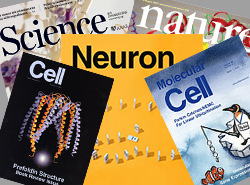Publication of IMPRS-LS student Friederike Laprell

Laprell F, Finkl K, Müller J.
Science, 2017, [Epub ahead of print].
Propagation of Polycomb-repressed chromatin requires sequence-specific recruitment to DNA.
Epigenetic inheritance models posit that during Polycomb repression, Polycomb Repressive Complex 2 (PRC2) propagates histone H3K27 tri-methylation (H3K27me3) independently of DNA sequence. We show that insertion of Polycomb Response Element (PRE) DNA into the Drosophila genome creates extended domains of H3K27me3-modified nucleosomes in the flanking chromatin and causes repression of a linked reporter gene. After excision of PRE DNA, H3K27me3 nucleosomes become diluted with each round of DNA replication and reporter gene repression is lost, whereas in replication-stalled cells, H3K27me3 levels stay high and repression persists. Hence, H3K27me3-marked nucleosomes provide a memory of repression that is transmitted in a sequence-independent manner to daughter strand DNA during replication. In contrast, propagation of H3K27 tri-methylation to newly incorporated nucleosomes requires sequence-specific targeting of PRC2 to PRE DNA.
